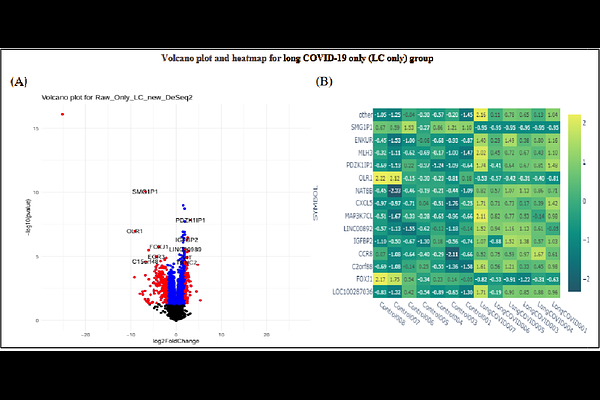Distinct Transcriptomic Biomarkers and Pathways Associated with Cardiovascular and Neurovascular Dysregulation in Long COVID-19 Brain Fog

Distinct Transcriptomic Biomarkers and Pathways Associated with Cardiovascular and Neurovascular Dysregulation in Long COVID-19 Brain Fog
Ashfaque, O.; Kumar, H.; Mazumder, M.
AbstractBackground: Long COVID-19 often manifests as persistent cognitive impairments, commonly referred to as brain fog, with poorly understood biological mechanisms. Previous studies highlighted neuroinflammation and blood-brain barrier disruption. Here, we identify distinct biomarkers and dysregulated pathways, with a focus on cardiovascular and neurovascular involvement. Methods: We analyzed public RNA-sequencing data (GEO: GSE251849) comparing long COVID-19 patients with brain fog, long COVID-19 patients without cognitive symptoms, convalescent patients, and healthy controls. Differential gene expression, principal component analysis, and pathway enrichment analyses were performed using DESeq2, KEGG, GO, and Enrichr tools. Results: Our analysis revealed a distinct gene expression profile in patients with brain fog, identifying exclusive biomarkers such as GRIN2C, NOS2, and EDNRB. Pathway analysis revealed significant dysregulation in cardiovascular, calcium signaling, and relaxin signaling pathways, suggesting novel biological mechanisms that contribute to cognitive impairment. These findings expand beyond neuroinflammation and highlight potential cardiovascular involvement in long COVID-related cognitive dysfunction. Conclusion: Our study reveals novel transcriptomic signatures that highlight cardiovascular and neurovascular dysregulation, providing promising diagnostic biomarkers and therapeutic targets. Future research should validate these findings and investigate therapeutic interventions addressing these unique pathways.